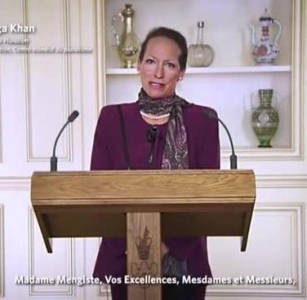Speech by Princess Zahra Aga Khan at the 8th Annual Global Centre for Pluralism Event 2021-05-19
Opening Remarks by Prince Zahra Aga Khan
8th Annual Pluralism Lecture (Virtual event)
May 19, 2021
Bismillah hir Rahmanir Rahim,
Ms Mengiste, Your Excellencies, Ladies and Gentlemen,
It is my very great pleasure to welcome you on behalf of His Highness the Aga Khan, and the entire Board of the Global Centre for Pluralism to our 8th Annual Pluralism Lecture
La conférence d’aujourd’hui est exceptionnelle, puisque c’est la toute première fois depuis la première conférence en 2012, lorsque nous avons accueilli la Présidente du Kyrgystan, Madame Roza Otunbayeva a Ottawa, que nous ne pouvons pas nous retrouver en personne. Il s’agit de la première conférence depuis que la pandémie de Covid-19 s’est déferlée sur la population humaine de notre planète, laquelle a encore des répercussions à l’échelle mondiale aujourd’hui.
The pandemic and the inequalities that it has magnified are a stark reminder of the urgency with which we must come together across our differences to build a more inclusive society. This is also the first lecture to feature a speaker from the world of the Literary Arts, an important yet often overlooked arena for advancing pluralism. These differences make today’s lecture particularly unique and memorable while also being tinged with sadness.
The opportunity to exchange with one another directly about the reflections and ideas that these lectures inspire will be deeply missed. However, technology has allowed us to gather in a virtual way and I encourage you to continue the conversations initiated by today’s lecture with those around you; your families, friends, colleagues and communities.
Engaging with one another to build mutual understanding and appreciation across our differences, the kind of dialogue which is at the heart of pluralism, must continue. There are important lessons to be learnt from the past year as the pandemic has transformed our societies and our institutions.
Our ability to work remotely has shown new approaches to reducing our climate footprint, and for example brought education to remote communities. These and other positive outcomes have the potential to strengthen our ambition to greater equity in and across our societies.
Today’s speaker Maaza Mengiste, has contributed in significant ways to bridging divides by illuminating the struggles and lives of individuals in communities that may be different from our own. How we talk about history at school, at home and through literature is a powerful part of how we create a sense of belonging and shared destiny as a society. Ms. Mengiste’s work reminds us of the hidden stories and voices that we must seek to amplify.
Her award winning works, of historical fiction “Beneath the Lion’s Gaze” and “The Shadow King” which was short-listed for the 2020 Booker prize, shade light on the experiences of migration, war and exile. Through her characters readers embark on a journey through Ethiopia’s history of political tensions, violence and occupation. We see the emotional and social toll that conflict can take, buried today in so many counties and societies from Syria, to Yemen and Myanmar.
Her writing also bears important witness to the strength and empowerment of people, particularly women in conflict. Born in Addis Ababa , Ethiopia, Ms. Mengiste lived in Nigeria and Kenya before moving to the United States. Her global perspective gives her work a resonance well beyond the Horn of Africa. Her writing considers how historical narratives and collective memories are shaped over time.
History and memory are central to pluralism. We see this in many countries where education is critical to building a pluralistic society. And in Canada, where the historical narrative is key in advancing reconciliation with Indigenous peoples.
When inclusive historical narratives can reflect a country’s diversity and foster belonging, an exclusionary narrative can deepen tensions and divisions between groups. These dynamics shape societal interactions for generations and can be challenging to change. Around the world, societies are grappling with the immense challenge of rebuilding after the pandemic. The recovery must be guided by principles of respect, empathy for one another and to secure a more equitable, just and prosperous future for us all.
Ms. Mengiste’s writings help us reflect on the important lessons about recovery, peace building and belonging to be learnt from the past. As we face numerous challenges in building pluralism, we need gifted, visionary, empathetic thinkers like herself.
Ladies and Gentlemen, it is, therefore, my very great privilege to welcome our Pluralism lecturer for 2021, Ms. Maaza Mengiste.
- 3327 reads
 Ismaili.NET - Heritage F.I.E.L.D.
Ismaili.NET - Heritage F.I.E.L.D.